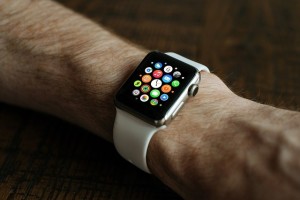
Between the creation of the market economy, advertising strategies, and increased disposable income, shopping has evolved from the limited purchasing of necessary household and survival items into a regular leisure activity engaged in by many on a regular basis.
Sales and shopping sprees are now associated with holidays (such as Black Friday or Boxing Day), life events (like engagements, weddings, or the arrival of a new baby), where consumers are inundated with advertisements flaunting yet another item we must "buy now, before it's gone!"
Modern shopping and purchasing can take place anytime, anywhere; with the advent of online shopping, purchasers can shop from the comfort of their own home, 24 hours a day with the click of a few buttons- most online shopping websites will even remember your shipping address and credit card info, to make purchases even faster!
Gone are the days where families would save money for months to purchase electronics for the home, or new outfits for the children to wear to school; the innovation of things like payment plans, in-store credit cards and multiple sales make the acquisition of goods so seamless that we have often purchased many items before even realizing we want or need them.
Unfortunately, this has led to a huge increase in unplanned purchases and impulse shopping.
What is Compulsive Shopping?
For a small percentage of the population, impulse buying or compulsive shopping can take on the form of a behavioural addiction, leaving many in financial and emotional distress. Most people have engaged in impulse buying at one time or another; but for some, the constant desire to shop and spend becomes problematic.
Compulsive shopping can be differentiated from planned purchasing (the purchasing of a specific item, that one had intended to purchase, usually purchased with money set aside for the particular item), and reminder impulse buying (spontaneously purchasing a necessary item upon seeing it in the store).
Compulsive shopping refers to those novelty purchases made in the absence of need, where the decision to purchase is made quickly, with little to no planning, often accompanied by an altered emotional state. For some, this may be in the form of "retail therapy" after a breakup, or purchasing a luxury item with the hopes of asserting dominance or social status in relation to the item.
Why do we do it?
Research shows that items purchased impulsively tend to be those related to the projection of self-image, and for some, these items may be used in an attempt to minimize the discrepancy between 'who we think we are' and 'who we want to be'.
 Shopping and purchasing becomes a problem when material goods are ascribed meaning, and used with hope that procuring the item will fill in the gaps between perceived and ideal selves; which may leave the consumer feeling even less satisfied after the purchase.
Shopping and purchasing becomes a problem when material goods are ascribed meaning, and used with hope that procuring the item will fill in the gaps between perceived and ideal selves; which may leave the consumer feeling even less satisfied after the purchase.
There may be a short-lived period of excitement and achievement after making the purchase, as the brain releases its "feel-good" hormone, dopamine, in response to the pleasurable experience associated with shopping.
The activity is then repeated, in search of the "high" associated with obtaining the desired item. Much like with drugs and alcohol, for certain individuals, a tolerance may build up, leading to increased bouts of compulsive shopping, and even feelings of withdrawal or mild depression when one cannot shop.
Guilt and shame may be associated with compulsive shopping, with many individuals going to great lengths to hide impulse purchases or the debt acquired as a result. And while compulsive shopping is not yet acknowledged as its own disorder of mental health, * it bears resemblance to behavioural addictions and impulse-control disorders, and is often prevalent in those with mood disorders, substance-use disorders, or eating disorders.
Overcoming a Consumption Driven World
Retailers and marketing strategists play on the consumer's impulsivity and materialism, which can make it very difficult to manage the compulsive urge to shop in this consumption-driven material world.
Successfully overcoming the urge to spend can be tricky when trying to differentiate items we need from items we want.
Strategies that might be useful to limit impulse buying could:
- Make a list prior to shopping.
- Stick within an allotted budget for the shopping trip.
- Shop with a friend or relative may also be helpful, if sticking to the list or budget is not successful.
- Use cash instead of debit or credit can be handy; it is much easier to stop shopping once the cash has run out, as opposed to using a credit card and "paying it back later". If using cash is not an option, perhaps speaking with a representative from your bank to set a daily spending limit might also help.
- As many impulse purchases tend to be those that are on sale, it might be ideal to use the express or self-serve checkout if available, to avoid the mandatory upsale offer from the store cashier.
- Cancel credit cards, or at least giving the cards to a supportive friend or relative can help to minimize debt occurred from shopping outside of one's budget; deleting personal information saved on online shopping websites might also be necessary to reduce the possibility of online shopping.
- Speak with a financial or mental health counsellor, if you don't feel that you are able to overcome the urge to shop on your own.
 Creating a contingency plan for both your finances and the urge to shop may be helpful in overcoming compulsive shopping.
Creating a contingency plan for both your finances and the urge to shop may be helpful in overcoming compulsive shopping.
A counsellor can provide cognitive behavioural therapy to reveal the underlying reasons contributing to impulse purchasing.
Pharmaceutical treatment with anti-depressants has been shown to reduce compulsive shopping, particularly for those with pre-existing mental health problems like depression and anxiety, obsessive-compulsive disorder, or other impulse-control disorders.
It could be that shopping is used as a means to alleviate low mood, and becomes a problem in and of its own; relieving the underlying psychiatric condition can then lead to recovery from the compulsive urge to shop.
*The Diagnostic and Statistical Manual of Psychiatric Disorders has acknowledged compulsive buying disorder within the "impulse control disorder not otherwise specified" section.
References:
Black, D. W. (2007). A review of compulsive buying disorder. World Psychiatry, 6, 614-618.
Dittmar, H., Beattie, J., & Friese, S. (1996). Objects, decision considerations and self-image in men's and women's impulse purchases. Acta Psychologica, 93, 187-206.
Hartston, H. (2012). The case for compulsive shopping as an addiction. Journal of Psychoactive Drugs, 44: 1, 64-67.
McElroy, S. L., Satlin, A., Pope, S. G., Keck, P. E., & Hudson, J. I. (1991). Treatment of compulsive shopping with antidepressants: A report of three cases. Annals of Clinical Psychiatry, 33(3): 199-204.
Wood, M. (1998). Socio-economic status, delay of gratification, and impulse buying. Journal of Economic Psychology, 19, 295-320.
Yi, S. & Baumgartner, H. (2010). Coping with guilt and shame in the impulse buying context. Advances in Consumer Research Vol. 37, 711-712. Eds. Margaret C. Campbell, Jeff Inman, & Rik Pieters. Duluth, MN: Association for Consumer Research.
About the author:
 Stephanie Sands is currently pursuing a Bachelor of Science degree in Kinesiology, majoring in Mind Sciences. She completed an Honors Degree in Psychology in 2012, focusing on eating disorders and personality.
Stephanie Sands is currently pursuing a Bachelor of Science degree in Kinesiology, majoring in Mind Sciences. She completed an Honors Degree in Psychology in 2012, focusing on eating disorders and personality.
She intends to combine her educational background into a holistic wellness practice, to strengthen mental health through a combination of counselling, physical activity, and nutrition coaching.
The opinions and views of our guest contributors are shared to provide a broad perspective of addictions. These are not necessarily the views of Addiction Hope, but an effort to offer discussion of various issues by different concerned individuals.
We at Addiction Hope understand that addictions result from a combination of environmental and genetic factors. If you or a loved one are suffering from an addiction, please know that there is hope for you, and seek immediate professional help.
Reviewed By: Jacquelyn Ekern, MS, LPC on January 31, 2016
Published on AddictionHope.com
